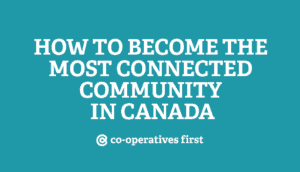By Kyle White, Community Outreach Co-ordinator
The formal announcement of the creation Co-operatives First on January 27th, 2016 set forth a media ripple through rural and First Nations communities across western Canada.
Several communities, particularly in Saskatchewan, began to contact Co-operatives First. Who are you? What can you do for us?
These calls show a clear demand for community-led solutions, even though there may be a knowledge deficit in rural and indigenous communities around the co-operative model. Community members are eager to discuss the challenges they face and learn new strategies, including co-operatives, that can meet these needs and keep capital in their community.
In many cases, community members have explored other options such as business or non-profit solutions, without success. Co-operatives First provides necessary information about the co-operative model, relevant examples of successful co-ops, insight on governance, and support for community meetings, contacts, and even thoughts on funding proposals.
Some of the needs brought forward include community gardens, aging-in-place infrastructure, technical services, and a grocery store.
Over the past year, one of the larger projects that has involved Co-operatives First staff along with researchers from the Centre for the Study of Co-operatives has been the creation of the Saskatchewan First Nations Technical Services Co-operative. This organization will provide technical services (water, engineering, housing inspections, etc.) to First Nation communities across Saskatchewan at the Tribal Council level. Our staff have worked with the board of directors to facilitate discussions on co-op governance, membership engagement, creating operational revenue, and applications for funding.
First Nations leaders recognized the value of working co-operatively. It gives them an advantage when delivering services and applying for proposals or funding.
Over the past two years, the Co-operative Innovation Project developed expertise in holding community engagement meetings in rural and indigenous communities. This is a service that Co-operatives First believes is a necessary part of rural and indigenous co-operative development — and is happy to offer to communities.
In Davidson, Saskatchewan, community members are exploring opportunities around aging-in-place infrastructure, including a senior’s facility. Residents were tired of seeing seniors leave the community to access services in Saskatoon and wanted a local alternative. When private development did not meet the community’s satisfaction they wanted to try a different model.
Co-operatives First staff is working with the community to create knowledge around the co-operative model and discuss some case studies from Saskatchewan. Community engagement in this process is essential to meet the current and future needs of the community in a way that builds local capacity and keeps capital (and people) in the community.

 Written by
Written by 


